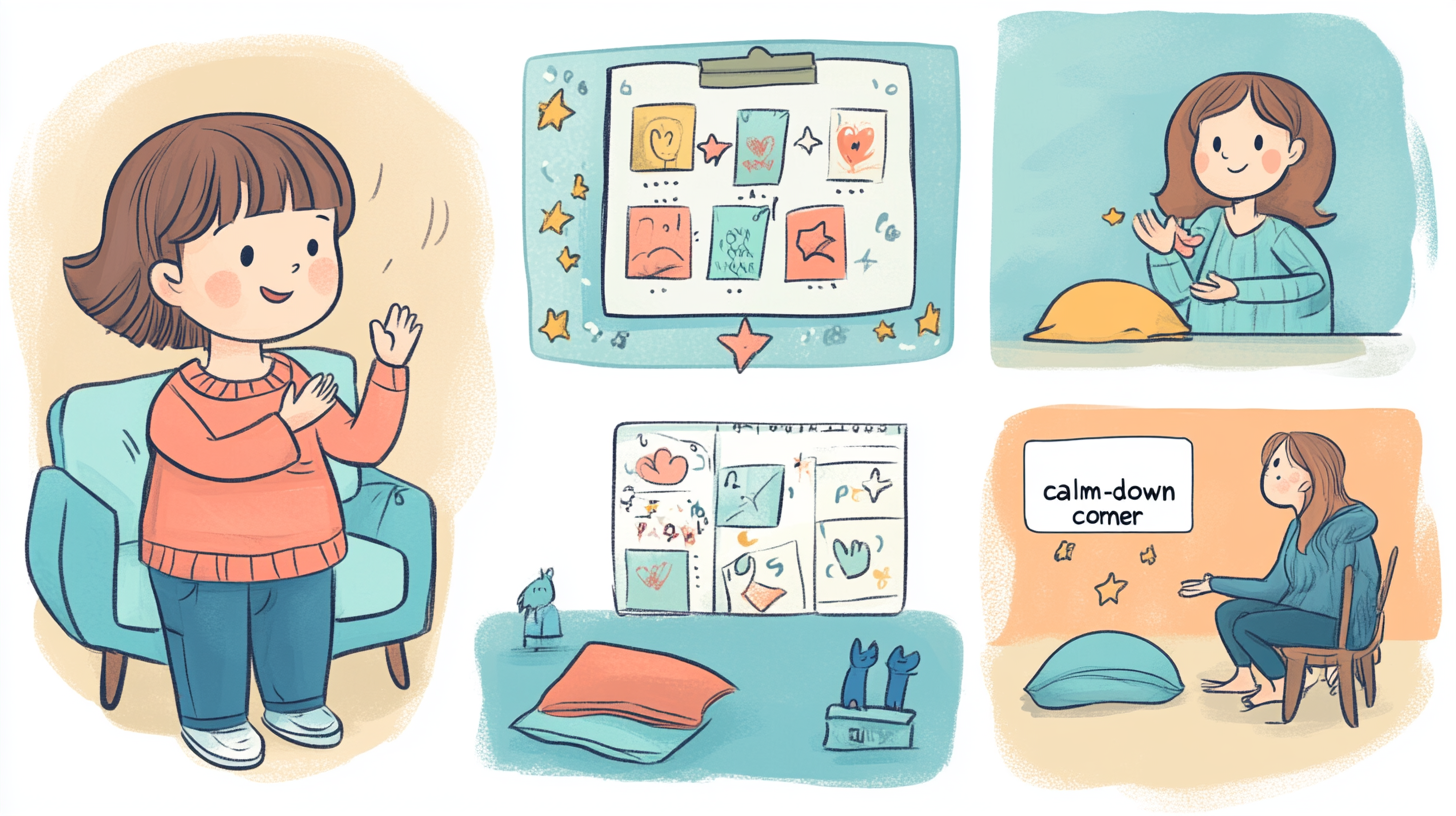
Children with Disruptive Mood Dysregulation Disorder (DMDD) often have big, intense feelings that are hard to control. They might have serious temper outbursts that happen several times a week over small things that wouldn’t upset other children.
Between these outbursts, they usually seem irritable or angry most of the time. Daily activities like getting ready for school or doing homework can trigger extreme reactions.
These children aren’t just being “difficult” – their brains process emotions differently. Family life can become stressful and unpredictable. Parents often feel lost, tired, and unsure of how to help.
The good news is that with the right approach and support, parents can learn effective ways to care for a child with DMDD while maintaining a peaceful home environment.
What Is DMDD and How Does It Affect Children?
Disruptive Mood Dysregulation Disorder (DMDD) is a childhood condition marked by extreme irritability, anger, and frequent, intense temper outbursts.
The disorder was added to the diagnostic manual in 2013 to better describe children with ongoing irritability and anger issues that were previously misdiagnosed.
Averagely, about 2-8% of children are affected by DMDD, with symptoms typically appearing before age 10.
How DMDD Affects Children?
Disruptive Mood Dysregulation Disorder affects children in below ways:
- Children struggle to regulate their emotions, leading to explosive reactions to small problems
- Daily functioning at home and school becomes challenging as mood issues interfere with learning and relationships
- Social development suffers as peers may avoid a child with unpredictable emotional responses
- Self-esteem often decreases as children feel bad about their inability to control their reactions
- Without proper treatment, these children face higher risks of developing depression and anxiety in adulthood
Early Signs and Symptoms of DMDD in Kids

Parents might notice signs of DMDD as early as preschool years. Toddlers and young children normally have tantrums, but children with DMDD have more severe, frequent, and longer-lasting outbursts that don’t match their developmental age.
Preschoolers might show extreme reactions to small frustrations, and school-age children may have explosive reactions to normal rules or requests.
Tweens and teens might exhibit ongoing irritability that seems beyond typical mood swings.
Symptoms of DMDD in Kids
Understanding DMDD (Disruptive Mood Dysregulation Disorder) requires recognizing key symptoms that differentiate it from typical childhood behavior patterns or other conditions. These symptoms represent persistent patterns rather than occasional difficulties.
- Severe temper outbursts (verbal or physical) that occur at least three times per week and are way out of proportion to the situation
- Persistently irritable or angry mood nearly every day, noticeable by others like parents, teachers, and friends
- Symptoms present for at least 12 months, without a break of 3 or more months.
- Symptoms appear in at least two settings (home, school, with peers)
- Significant problems with functioning in family, school, or social activities
Early identification and proper diagnosis form the foundation for effective intervention. Getting an accurate diagnosis is the first step toward helping a child manage these challenging symptoms and develop appropriate coping strategies.
Parenting Strategies That Help Kids with DMDD Thrive

Parents play a crucial role in helping children with DMDD learn to manage their emotions and behavior. With consistent approaches, the home can become a place where healing begins.
- Create a calm, predictable environment: Keep daily routines as consistent as possible. Children with DMDD do better when they know what to expect. Use visual schedules to help them understand the day’s plan.
- Learn to recognize triggers: Pay attention to what situations, times of day, or activities tend to trigger outbursts. Sometimes hunger, tiredness, sensory overload, or transitions can set off a reaction.
- Stay calm during outbursts: Though incredibly difficult, remaining calm during a child’s outburst helps prevent escalation. Use a neutral, matter-of-fact tone rather than showing anger or frustration.
- Use positive reinforcement: Catch your child being good! Notice and praise moments of emotional control, problem-solving, or positive social interaction.
- Teach emotional vocabulary: Help children name their feelings with simple words. Many children with DMDD struggle to identify emotions before they become overwhelming.
- Practice coping skills during calm times: Work on breathing techniques, counting to ten, or using a calm-down corner when the child is not upset. This helps them build skills they can eventually use during difficult moments.
Remember that progress may be slow, but with consistent support, children can learn healthier ways to express their emotions.
How Teachers Can Support a Child with DMDD

Teachers spend many hours each day with students and can make a huge difference for children with DMDD. Working together with parents, teachers can help create a supportive school environment.
- Establish clear, consistent expectations: Children with DMDD benefit from knowing exactly what’s expected in the classroom. Clear rules, posted visually, help provide structure.
- Create a safe space for calming down: Designate a quiet corner or area where the child can go when feeling overwhelmed. Stock it with calming tools like stress balls, headphones, or drawing materials.
- Use non-verbal cues for escalating behavior: Develop private signals with the student to alert them when their behavior intensifies, allowing them to use coping strategies before losing control.
- Focus on strengths and interests: Find ways to highlight the child’s strengths in front of peers. This builds confidence and creates positive associations with school.
- Maintain regular communication with parents: Share both successes and challenges with parents so strategies can be consistent between home and school.
With proper support at school, children with DMDD can experience academic success and build important social skills that will serve them throughout life.
Caring for Yourself While Raising a Child with DMDD

Parenting a child with DMDD can be emotionally and physically draining. Taking care of your own well-being isn’t selfish—it’s necessary to be the best parent possible.
- Join a support group: Connect with other parents facing similar challenges, either in person or online. Sharing experiences reduces isolation and provides practical ideas.
- Take breaks: Arrange for trusted family members, friends, or respite care to give you regular breaks. Even short periods away can help restore your energy.
- Practice self-compassion: Remind yourself that you’re doing your best in a difficult situation. No parent handles every moment perfectly.
- Maintain your own health: Prioritize basics like sleep, healthy meals, and physical activity. Your physical health affects your emotional resilience.
- Seek your own therapy: Consider speaking with a therapist who can provide coping strategies specifically for parents of children with emotional disorders.
Remember that taking care of yourself isn’t a luxury—it’s essential for creating the stable, loving environment your child needs to thrive.
When and How to Get Professional Help for DMDD?

Professional help is almost always needed for children with DMDD. The combination of symptoms is too complex to manage through parenting strategies alone.
If your child shows persistent irritability and frequent, severe tantrums that interfere with normal functioning, it’s time to seek help.
Ways to get professional help for DMDD:
- Start with your pediatrician: They can provide an initial assessment and referrals to appropriate mental health professionals.
- Find a child psychiatrist or psychologist: Look for professionals with experience in childhood mood disorders and behavioral therapy.
- Ask about cognitive behavioral therapy (CBT): This effective approach helps children identify thought patterns and develop coping skills.
- Consider parent training programs: These teach specific techniques for managing difficult behaviors at home.
- Discuss medication options: Some children benefit from medications that help regulate mood and reduce irritability.
Early intervention can significantly improve outcomes, so don’t wait to seek help if you notice concerning patterns in your child’s behavior.
The Bottom Line
Raising a child with DMDD presents unique challenges, but with understanding, patience, and proper support, these children can learn to manage their emotions and thrive.
Life isn’t always easy, but each small improvement is worth celebrating. Parents are not alone in this process—healthcare providers, educators, and support groups can offer valuable guidance and encouragement.
With time and consistent approaches, many children with DMDD show significant improvement in their ability to regulate emotions and build healthy relationships.
Though the path may sometimes feel overwhelming, there is hope and help available for families to find their way through this challenging disorder.
If you’re interested in more informational content on mothers and babies, feel free to click here and explore other blogs that you might enjoy.

